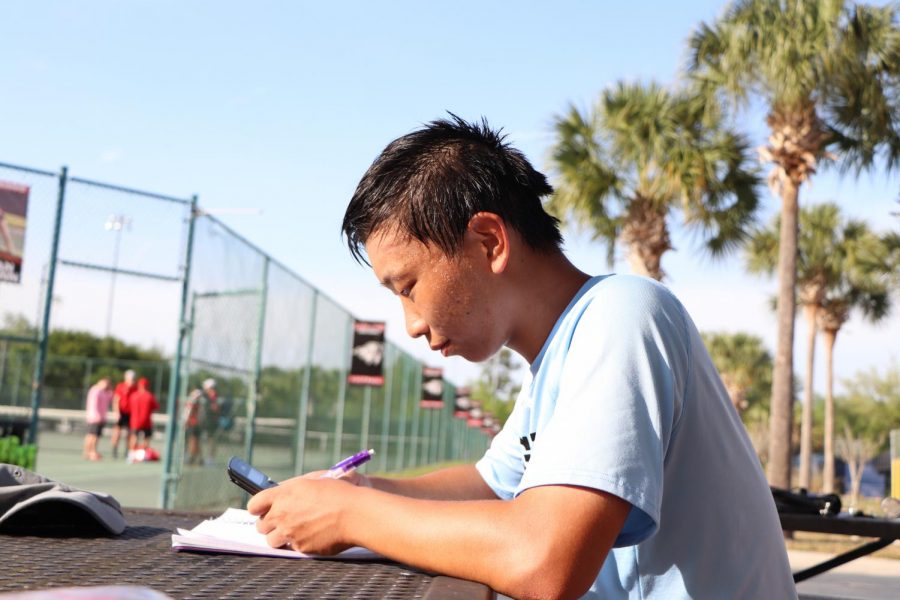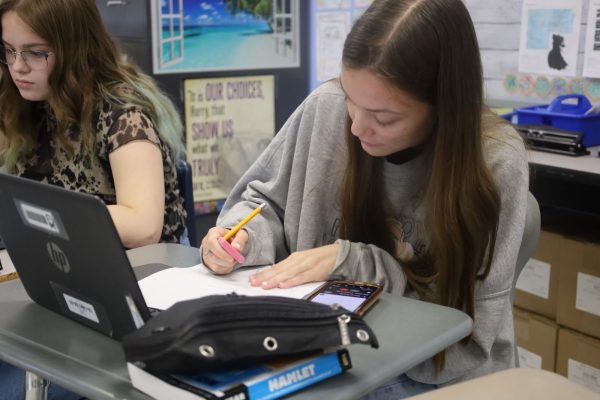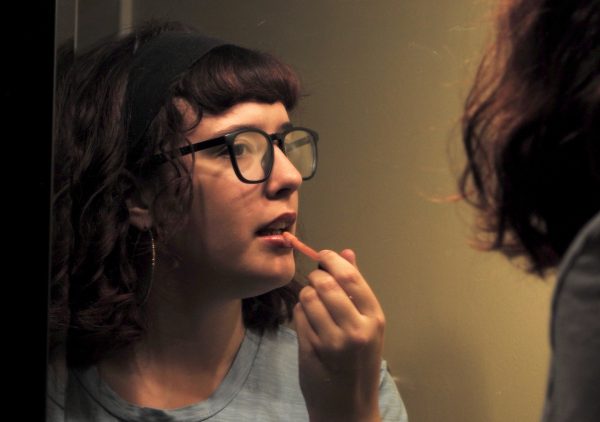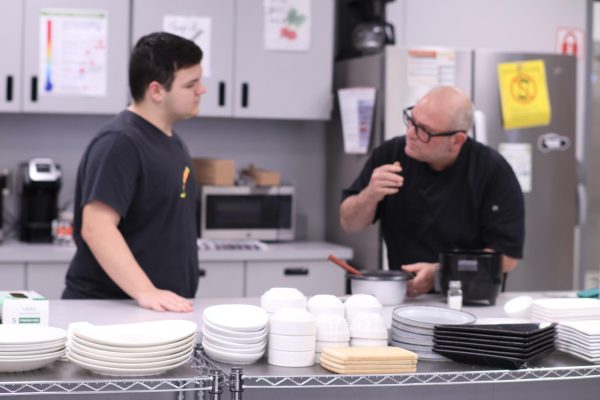Not always a gift
Many have found that the gifted program, though good in theory, has its fair share of flaws
photo by Sarah Hinnant
Senior Nicolas Cai works on his homework at tennis practice. Being in the gifted program often required setting aside a lot of time for assignments.
Reciting numbers to prove one’s memory, solving various brain-teaser puzzles, and demonstrating basic literacy and math skills — all rudimentary tests to see if an elementary or middle schooler belongs in the “gifted” program. As young as 5 or 6 years old, students’ entire academic futures are predetermined for them with a simple, cognitive test.
The premise of the gifted program makes sense and can work well for those gifted and not gifted. Everyone learns at different paces and in different ways, so it is important to allow students to reach their greatest potential in school.
“I think the gifted program played a role in encouraging me to challenge myself. It [had] harder classes that suited me better,” junior Joshua Nemery said.
The point of the program is to set students on a track best suited to them, so that classes are not too easy or difficult. Passing the gifted test sets students on a higher track with faster-paced classes. In elementary school, this mostly translates to going to an “extra” class once a week to do different activities — such as logic puzzles and research projects — with other gifted students. In high school, this pushes students to take Honors, AP, and dual enrollment courses. It also guarantees students a spot in select classes with qualified teachers.
“The biggest benefit is that gifted classes guarantee the student will have a teacher who is certified to work with gifted students,” counselor Nick Maby said, who is in charge of helping gifted students transition from middle to high school. “These teachers have a better understanding of the approach gifted minds will often take to problem solving.”
And yet, while these things can greatly aid a student’s educational experience, many have started to pick up on the deeper problems as they go through high school. “Gifted kid burnout” was a term popularized on TikTok last year to describe the exhaustion students have developed from the gifted program, and countless people have found themselves identifying with it.
Freshman Mikayla Guild, who started the program in third grade, switched to standard classes last year around the time the pandemic started. The pressure of being in tougher classes with higher expectations can often be too much, and Guild is an example of that.
“The gifted program has torn down my self esteem. I’ve always been told I’m basically not enough, and my peers looking down on me really affected me,” Guild said.
The problem students find is not necessarily the workload, but the social pressures. Teachers, peers and parents will place a lot of responsibility on those who are expected to be “smart,” which can trigger immense stress if the student feels like they are not smart enough, or if they are unable to devote enough attention to school.
This pressure has repeatedly led to a stratification between those who are and are not in the gifted program, and the stigmas go both ways. People in all class levels have noticed how gifted students can develop a sense of superiority over their other peers in standard classes, even though being in a standard class does not mean someone is not smart.
Senior Sana Yooseph, who is in the gifted program, feels that this competitive atmosphere is a significant problem. Having moved from California, her gifted status did not transfer over correctly, and she was not placed in all of the same advanced classes as her friends in middle school.
“I remember all of those Algebra I kids [in middle school] were like, ‘Oh, we have an EOC and you guys don’t… Algebra I is crazy,’” Yooseph said. “Sometimes it can come across as an elitist thing.”
On the flip side, developing ideas of superiority can harm those in the gifted program in the long run. Oftentimes, a gifted student will spend the majority of their schooling career breezing through classes and receiving constant praise for their intelligence, so when they are faced with challenging work, they do not know how to deal with it. Students not in the program learn earlier on how to ask for help and study hard, but this can be difficult for gifted students to do if they never had to in the past.
“It planted a very flawed perception of mine that we were ‘chosen’ as model students,” senior Nicolas Cai said. “Having been so used to ‘knowing all the right answers’ backfired whenever I faced something I just couldn’t figure out myself.”
Yooseph believes that the social and academic hierarchy that the gifted program pushes can hinder students’ wellbeing more than it can preserve it. While many find the program to be an excellent platform for finding their work pace in school, the expectations placed on students and the intersocial problems it causes are pointless in her eyes. She thinks the mere title of “gifted” has only proven to breed insecurities and stress.
Your donation will support the student journalists of Hagerty High School. We are an ad-free publication, and your contribution helps us publish six issues of the BluePrint and cover our annual website hosting costs. Thank you so much!












